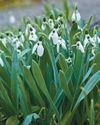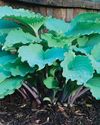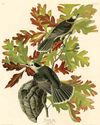
AS DIRECTOR OF Ornamental Plant Research at the Chicago Botanic Garden, Richard Hawke evaluates perennials and woody plants for garden merit. In 2023, he received the Arthur Hoyt Scott Medal & Award, which recognizes someone who has made an outstanding national contribution to gardening.
SCOTT BEUERLEIN: Tell us a little bit about your background and how you came to be at your current job.
RICHARD HAWKE: Although my college path seemed circuitous at the time, it was fairly linear in hindsight. I started in architecture, moved to landscape architecture after briefly toying with forestry, and finally landed on horticulture. It just felt right once I got there, and I thank Dr. Ed Hasselkus, professor emeritus at the University of Wisconsin-Madison, for inspiring me to pursue a degree and career in horticulture.
My mantra after graduation was "What now?" I'd done a summer internship at the Paine Art Center and Garden in Oshkosh but otherwise had limited practical experience and really no idea of the scope of horticultural possibilities. After a few disappointing and soul-sucking interviews at landscape companies, Ed suggested I do an internship at the Chicago Botanic Garden. I learned two important things from my internships-a public garden was where I belong, and I wasn't keen on doing landscape maintenance. I've always believed that internships are the perfect place to discover what you want to do as much as what you don't.
This story is from the July - August 2024 edition of Horticulture.
Start your 7-day Magzter GOLD free trial to access thousands of curated premium stories, and 9,000+ magazines and newspapers.
Already a subscriber ? Sign In
This story is from the July - August 2024 edition of Horticulture.
Start your 7-day Magzter GOLD free trial to access thousands of curated premium stories, and 9,000+ magazines and newspapers.
Already a subscriber? Sign In

Pot It Up
Shake up the containergarden with theseNorth America –native perennials

THE GARDEN PATH TO PERDITION
I WAS CRUISING RIGHT ALONG, feeling okay about myself, when I came across a list of the Seven Deadly Sins.

A Productive PATIO
Tiny fruit, vegetable and herb plants help gardeners maximize any sort of growing space

TROPICAL FUSION
A FUSS-FREE APPROACH TO USING BOLD TROPICAL PLANTS IN ANY TEMPERATE GARDEN

WINTER READING
Pass the time with any of these inspiring books

SENSING A PATTERN
Greg Coppa reflects on an odd weather year and what continued warming may mean for his Rhode Island garden

TOP-PRIZE PERENNIALS
A foliage masterpiece for shade and a late bloomer for sun

MARK WESSEL
What's new for fruit and vegetable gardeners?

KINGS OF THE NORTHERN FORESTS
A look at the trees, shrubs and perennial plants that bolster life in Ecoregion 5

PROJECT FEEDERWATCH
Gardeners can help scientists know just where the birds are in winter